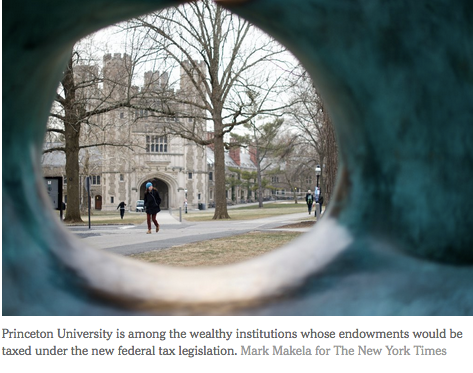The tax legislation approved this week by Congress is a mixed bag. It combines some badly needed reforms with various messy provisions seemingly designed to keep accountants and tax lawyers fully employed. But the part of the bill that most disappoints me is a small, simple change in policy: a new tax on large university endowments.
True, I am not completely objective here. I have spent the past 40 years of my life at three of the targeted institutions, as an undergraduate at Princeton, graduate student at the Massachusetts Institute of Technology, and faculty member at Harvard.
And the tax is not huge. It is a mere 1.4 percent of investment income and is expected to raise only $1.8 billion over 10 years. Because it applies only to universities with endowments of more than $500,000 per student, just a few dozen schools are affected.
But this new tax is not trivial. Take Princeton. It has an endowment of $24 billion. If it earns a 10 percent return, the annual cost of the tax will be roughly $34 million, more than $4,000 per student (including both undergraduate and graduate students).
I try to see both sides of an argument, but it is hard to justify this policy. It seems inconsistent with the stated objectives of Republican leaders.
The tax bill, we are told, aims to promote economic growth by creating an environment more favorable to investment. That is the main argument for the cut in the corporate tax rate to 21 percent from 35 percent.
But the investment that leads to growth is not just in plant and equipment. It also includes human capital, which means educating our labor force. And it includes the knowledge that flows from basic research. The United States is an economic superpower in part because we have the best university system in the world. The tax bill undermines that.
Republican leaders say that they want to help the middle class. They claim that over time, as corporate tax cuts encourage investment and increase productivity, the benefits will accrue not only to wealthy shareholders but also to workers in the form of higher wages. I believe that, but I also believe that for many people, the surest route to higher wages is increased skills.




